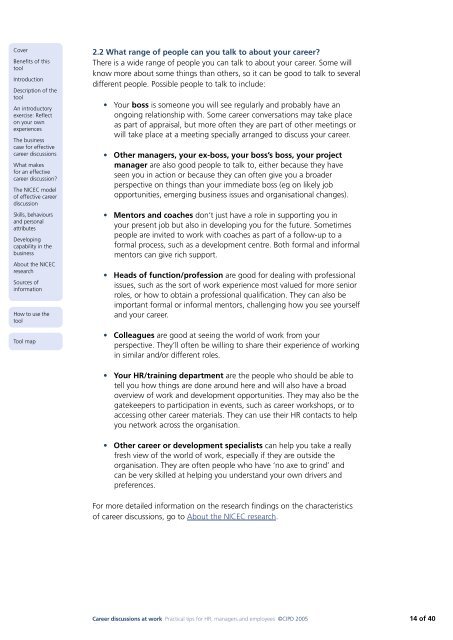Career Discussions at Work, Practical Tips for - CIPD
Career Discussions at Work, Practical Tips for - CIPD
Career Discussions at Work, Practical Tips for - CIPD
You also want an ePaper? Increase the reach of your titles
YUMPU automatically turns print PDFs into web optimized ePapers that Google loves.
Cover<br />
Benefits of this<br />
tool<br />
Introduction<br />
Description of the<br />
tool<br />
An introductory<br />
exercise: Reflect<br />
on your own<br />
experiences<br />
The business<br />
case <strong>for</strong> effective<br />
career discussions<br />
Wh<strong>at</strong> makes<br />
<strong>for</strong> an effective<br />
career discussion<br />
The NICEC model<br />
of effective career<br />
discussion<br />
Skills, behaviours<br />
and personal<br />
<strong>at</strong>tributes<br />
Developing<br />
capability in the<br />
business<br />
About the NICEC<br />
research<br />
Sources of<br />
in<strong>for</strong>m<strong>at</strong>ion<br />
How to use the<br />
tool<br />
Tool map<br />
2.2 Wh<strong>at</strong> range of people can you talk to about your career<br />
There is a wide range of people you can talk to about your career. Some will<br />
know more about some things than others, so it can be good to talk to several<br />
different people. Possible people to talk to include:<br />
• Your boss is someone you will see regularly and probably have an<br />
ongoing rel<strong>at</strong>ionship with. Some career convers<strong>at</strong>ions may take place<br />
as part of appraisal, but more often they are part of other meetings or<br />
will take place <strong>at</strong> a meeting specially arranged to discuss your career.<br />
• Other managers, your ex-boss, your boss’s boss, your project<br />
manager are also good people to talk to, either because they have<br />
seen you in action or because they can often give you a broader<br />
perspective on things than your immedi<strong>at</strong>e boss (eg on likely job<br />
opportunities, emerging business issues and organis<strong>at</strong>ional changes).<br />
• Mentors and coaches don’t just have a role in supporting you in<br />
your present job but also in developing you <strong>for</strong> the future. Sometimes<br />
people are invited to work with coaches as part of a follow-up to a<br />
<strong>for</strong>mal process, such as a development centre. Both <strong>for</strong>mal and in<strong>for</strong>mal<br />
mentors can give rich support.<br />
• Heads of function/profession are good <strong>for</strong> dealing with professional<br />
issues, such as the sort of work experience most valued <strong>for</strong> more senior<br />
roles, or how to obtain a professional qualific<strong>at</strong>ion. They can also be<br />
important <strong>for</strong>mal or in<strong>for</strong>mal mentors, challenging how you see yourself<br />
and your career.<br />
• Colleagues are good <strong>at</strong> seeing the world of work from your<br />
perspective. They’ll often be willing to share their experience of working<br />
in similar and/or different roles.<br />
• Your HR/training department are the people who should be able to<br />
tell you how things are done around here and will also have a broad<br />
overview of work and development opportunities. They may also be the<br />
g<strong>at</strong>ekeepers to particip<strong>at</strong>ion in events, such as career workshops, or to<br />
accessing other career m<strong>at</strong>erials. They can use their HR contacts to help<br />
you network across the organis<strong>at</strong>ion.<br />
• Other career or development specialists can help you take a really<br />
fresh view of the world of work, especially if they are outside the<br />
organis<strong>at</strong>ion. They are often people who have ‘no axe to grind’ and<br />
can be very skilled <strong>at</strong> helping you understand your own drivers and<br />
preferences.<br />
For more detailed in<strong>for</strong>m<strong>at</strong>ion on the research findings on the characteristics<br />
of career discussions, go to About the NICEC research.<br />
<strong>Career</strong> discussions <strong>at</strong> work <strong>Practical</strong> tips <strong>for</strong> HR, managers and employees ©<strong>CIPD</strong> 2005<br />
14 of 40

















